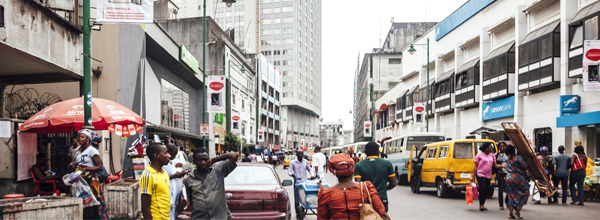
MacArthur announced today nearly $9 million in funding to advance accountability and anti-corruption efforts in Nigeria. The grants are part of the Foundation’s On Nigeria grantmaking, which seeks to reduce corruption by building an atmosphere of accountability, transparency, and good governance in the country.
The grants will support nonprofits working to advance criminal justice reform or fight corruption in Nigeria. The organizations will collaborate with other Foundation-supported partners in Nigeria, including several that are focused on enhancing investigative journalism and reducing corruption in the electricity and education sectors, two services that Nigerians report as being critical but difficult to access due to corruption.
“Addressing corruption requires action and partnership among a wide array of people and groups, including those in government, the media, civil society, communities, and consumers,” said Kole Shettima, Director of MacArthur’s Nigeria Office. “These grants will reinforce and expand the growing network of organizations partnering across disciplines to contribute to a culture of investigation, advocacy, accountability, and transparency.”
Criminal Justice Grants
Grants in support of criminal justice organizations seek primarily to further state-level adoption and implementation of the Administration of Criminal Justice Act (ACJA), which aims to ensure that administration of criminal justice in Nigeria promotes efficient management of criminal justice institutions, speedy dispensation of justice, protection of society from crime, and protection of the rights and interests of the suspect, defendant, and victim. The grants include:
- CLEEN Foundation (Abuja): To create a comprehensive online repository that catalogs, analyzes, and provides detailed information on corruption cases and to facilitate monitoring of implementation and compliance with the ACJA in corruption cases.
- International Federation of Women Lawyers (FIDA)/Nigeria: To provide technical assistance to states working to adopt and implement the ACJA.
- Nigerian Bar Association (Abuja): To promote the adoption and implementation of the ACJA by providing technical support to state governments.
- Nigerian Institute of Advanced Legal Studies (Abuja): To promote understanding of the ACJA through tailored trainings and continuing legal education for judges, prosecutors, and defense lawyers.
- Rule of Law and Empowerment Initiative (Abuja): To promote the implementation of the ACJA in Lagos and Ondo states by enhancing citizen participation in judicial processes through case monitoring, daily observation of court cases, and user satisfaction surveys.
Civil Society Grants
Grants to civil society organizations will support activities related to reducing corruption, including efforts to leverage and respond to investigative journalism regarding corruption. They include:
- African Centre for Leadership, Strategy & Development (Abuja): To educate civil society organizations on Nigeria’s plan for implementing the Open Government Partnership, an initiative to secure commitments from governments to promote transparency, empower citizens, fight corruption, and strengthen governance.
- African Centre for Media & Information Literacy (Abuja): To build public awareness, support, and advocacy for Nigeria’s new whistle-blower policies, which seek to encourage and protect citizens who report corruption-related offenses.
- Arewa Research & Development Project (Kaduna): To amplify investigative news reports on corruption and organize civil society and community organizations to actively participate in the campaign against corruption.
- Center for Transparency Advocacy (Abuja): To mobilize Nigerians to embrace non-violent forms of campaigns and protests against impunity and corrupt governance in the country.
- Civil Society Legislative Advocacy Centre (Abuja): To amplify the reach of investigative reports related to corruption and to improve mechanisms and systems for preventing, detecting, and punishing corruption.
- Connected Development (Abuja): To monitor and advocate for accountability in the flow and use of Universal Basic Education Funds in Kaduna state.
- Human & Environmental Development Agenda (Lagos): To mobilize community engagement around corruption cases and to strengthen the capacity of Nigerian civil society to understand international mechanisms to reduce corruption.
- Social Development Integrated Centre (Port Harcourt): To respond to investigative reports on corruption by organizing, mobilizing, and coordinating with community groups.
- Shehu Musa Yar'Adua Foundation (Abuja): To establish an anti-corruption advocacy and mobilization platform focused on the education and electricity sectors and to feature stories of success and progress in the fight against corruption.
- Youth Initiative for Advocacy, Growth and Advancement (Abuja): To engage and mobilize young people in the fight against corruption through social media and various forms of journalism.
MacArthur’s On Nigeria grantmaking supports Nigerian-led efforts to address the corruption, impunity, and lack of accountability that have posed major governance challenges in Nigeria, with far-reaching impacts on the well-being of Nigerians and development in the country. The Foundation is focused on reducing incidences of petty or retail corruption that citizens experience every day, addressing issues of grand corruption that reinforce a culture of corruption, strengthening the criminal justice system, and building citizen demand for and confidence in anti-corruption efforts. MacArthur has been making grants in Nigeria since 1989, opening an office in Abuja in 1994 staffed by Nigerians.



